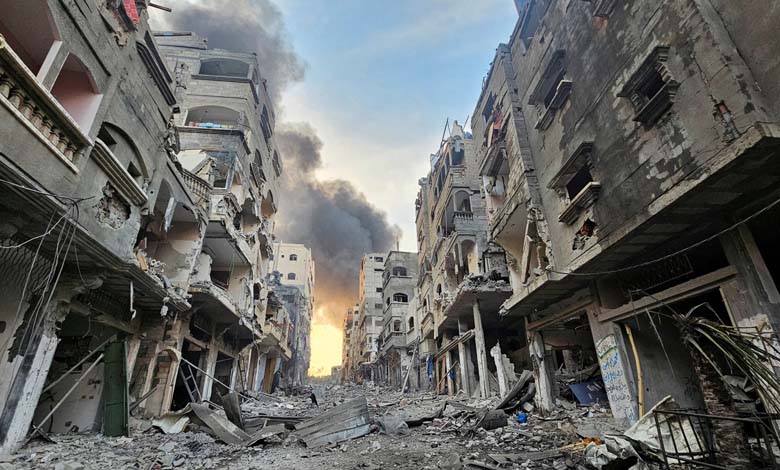From a Vibrant City to Silent Ruins: Jabalia between the Fire of War and the Hope for an End

Jabalia, once the main city in northern Gaza and home to nearly 200,000 people, is now a barren wasteland of destroyed buildings.
However, Israeli soldiers, conducting their third offensive there since the Gaza war began in October 2023, have no clear timeline for their departure.
-
Gaza Ceasefire: “Slow” Steps Amidst Gaps and Obstacles
-
Gaza War: Israel Reveals Its Soldier Death Toll and the Rise in Soldier Suicides
The Economist made a brief visit to Jabalia, accompanied by an infantry company commander.
The commander stated, “We have a mission here. There are still Hamas snipers hiding and setting ambushes. This is now the most bitter guerrilla warfare.”
While young soldiers and officers may still believe in the mission, their former leader, Yoav Galant, the defense minister dismissed last November, privately admitted that the military no longer has a clear objective in Gaza.
-
“Death Trap” in Gaza: International Report Condemns Israel’s Actions
-
Gaza Welcomes 2025 with “Wasted Hope”: Talks of a “Deadlock” in Negotiations
According to The Economist, Israeli soldiers sometimes encounter civilians in the area, forcing them to join the approximately 1.5 million displaced people crowded into southern Gaza.
The major accompanying the publication noted that the operation in Jabalia, now entering its fourth month, could continue indefinitely or end within days if a ceasefire being negotiated in Cairo and Doha is reached.
Only a few thousand civilians remain in northern Gaza.
Some right-wing Israeli politicians and generals aim to prevent former residents from returning to their homes. Others insist that Israel’s military presence is temporary until an agreement is reached with Hamas, which launched a surprise attack on Israeli settlements near Gaza on October 7. However, such an agreement remains elusive.
Since that attack, Israel’s ongoing war on Gaza has killed over 45,000 Palestinians, more than half of whom were civilians, according to the Ministry of Health in the besieged territory.
Cautious Optimism
Meanwhile, with less than two weeks remaining in President Joe Biden’s term, his advisors express hope that Israel and Hamas are nearing a ceasefire agreement in Gaza.
This optimism comes as the Biden administration and President-elect Donald Trump’s team collaborate to reach an agreement before Trump’s inauguration on January 20.
Trump’s envoy, Steve Witkoff, is in Doha this week, participating in discussions alongside Brett McGurk, the White House coordinator for the Middle East and North Africa.
-
The Countdown to Trump’s Inauguration: Gaza Truce Hopes Fade amid Rising Tensions
-
In Jerusalem and Bethlehem… Gaza’s agony overshadows the joy of Christmas
On Tuesday, Trump reiterated his warning of consequences if the hostages in Gaza are not released before his inauguration, threatening unspecified destruction in the Middle East.
Speaking from his Mar-a-Lago residence, Trump said, “If they are not back by the time I take office, hell will break loose in the Middle East. It won’t be good for Hamas or anyone else.”
Witkoff told reporters he hopes to finalize a deal before the inauguration, hinting at a possible 42-day ceasefire.
A senior Biden administration official told NBC News that within the next 24 to 48 hours, it will become clear whether a deal is likely.
-
Water Crisis in Gaza: Human Rights Watch Accuses Israel of Genocide
-
Gaza and the West Bank in 2024: Numbers Unveil a “Tragedy”
The agreement includes the release of 34 hostages, though the exact number of survivors remains uncertain.
While one U.S. official expressed optimism, another warned that the process remains delicate, stating, “Hamas must make a political decision.”
This official revealed that the negotiations have been tense, with Mohamed Sinwar, brother of the late Hamas leader Yahya Sinwar, proving especially uncompromising.
-
Details of the “Gaza Truce”: Disputes over “Prisoners” and Flexibility on the “Israeli Withdrawal”
-
International Report: Israel’s War in Gaza is the most “Deadly and Destructive” Ever
-
Decisive Hours: Intense Arab Efforts to End the Gaza War Quickly












